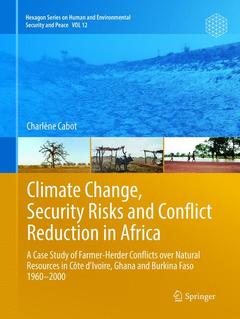Climate Change, Security Risks and Conflict Reduction in Africa, 1st ed. 2017 A Case Study of Farmer-Herder Conflicts over Natural Resources in Côte d'Ivoire, Ghana and Burkina Faso 1960-2000 Hexagon Series on Human and Environmental Security and Peace Series, Vol. 12
Auteur : Cabot Charlène

From the Contents: Part 1: The climate induced Degradation and increased Scarcity of Resources as Factors challenging security.- Introduction into current Climate Change, Conflict Concerns and Farmer-Herder Conflicts.- Literature Review: Causal Linkages between Environmental Change and Conflict.- Part 2: Theoretical Background: The Importance of Political Factors in a precarious Human and Environmental Security challenged by global, regional and local Environmental Changes.- Theoretical Prisms: Human and Environmental Security and Conflict Reduction.- The Role of Political Factors in Undermining or Maintaining Environmental and Human Security in a context of Climate Change.- Part 3: Case Study: Farmer-Herder Conflicts in Burkina Faso, Côte d’Ivoire and Ghana.- Background Information.- Methodological Approach to the Case Study.- Study of the three Research Hypotheses in the three selected Countries.
Thorough introduction to key concepts on the links between climate change and conflicts
Work provides practical approach: how can politics and policies help reduce climate conflicts
Work focus on a vulnerable region (Western Africa) where more information is needed to face the upcoming challenge
Includes supplementary material: sn.pub/extras
Date de parution : 06-2018
Ouvrage de 190 p.
21x27.9 cm
Disponible chez l'éditeur (délai d'approvisionnement : 15 jours).
Prix indicatif 105,49 €
Ajouter au panierDate de parution : 11-2016
Ouvrage de 190 p.
21x27.9 cm
Disponible chez l'éditeur (délai d'approvisionnement : 15 jours).
Prix indicatif 105,49 €
Ajouter au panier


